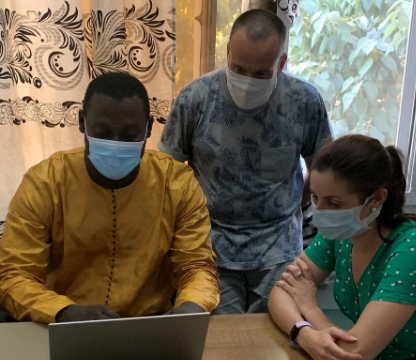

L-R: Mustapha Sanyang (Head of Rapid Response Team), Ioannis Karagiannis (Epidemiologist), Liz Marchant (Reservist Epidemiologist)
Following a concerning increase in cases of COVID-19 in August 2020, the UK-PHRST received a request for support from The Gambia Ministry of Health (MoH). Whilst transmission had slowed, considerable uncertainty remained about the current situation given both limitations of surveillance and concerns about the readiness to confront further waves of COVID-19. The UK-PHRST deployed two experts, each in epidemiology and microbiology, for 3-5 weeks to support the MoH on three main areas:
- Delivering a data-driven response
- Developing surveillance and diagnostic capacity
- Supporting co-ordination.
DATA-DRIVEN RESPONSE
The epidemiology team spent most of their time working with the surveillance team on streamlining data flows on tests and cases, developing new data flows on hospitalisations and deaths, and improving data quality and completeness. We worked together to develop routine analysis for presentation at the bi-weekly COVID-19 coordination meetings, which served to keep ministers and health leaders informed of the situation as the pandemic continues. We reviewed public facing outputs to enhance the information available and elected to include key messages in different formats, such as maps and graphics. This helped daily coordination by providing the seven geographical regions of The Gambia with a visual representation of the pandemic. It also informed the public where there is a higher prevalence of the virus and equally compared regions on daily sample collection activities. The bi-weekly analysis also informed the covid-19 national coordination body of the early detection of the second wave, improving preparedness country-wide. The analysis has helped to simplify the reporting of the geographical distribution of cases within the country.
SURVEILLANCE AND DIAGNOSTIC CAPACITY
In the first phase of the response, the MoH focussed on establishing essential testing, contact tracing and case management capacity. Much of this capacity was focussed in and around the capital Banjul, which hosts the only government laboratory with diagnostic capacity, major health facilities, and the national rapid response team. The distribution of cases reflects this and there is little understanding of the extent of transmission outside the Banjul area. The team undertook a joint visit to four of the seven regional health teams to discuss the challenges that teams were facing with identifying suspected cases, accessing testing, and engaging the community. Discussions with regional teams on the ground proved insightful and provided the team with the opportunity to understand day-to-day challenges more effectively than other forms of communication. The findings of this visit enabled the pandemic response to be locally tailored and recommendations were channelled through MoH to find solutions. This has created a coordination system between the regions and at the central level, unlike anything seen before.
Extension of laboratory services will take place soon, therefore improving access to testing outside of the Banjul area, and to increase overall testing capacity. As experienced by the UK and many countries, despite the increased testing capacity, decisions over how this can be utilised in the face of competing demands will still prove challenging. A combination of testing suspected cases, testing for incoming and outgoing travellers, and proactive testing for high-risk individuals will have to be deployed. Workshops were held with health leaders to review guidance on testing of different groups to ensure effective use of capacity and standard practice around the country. A strategy is in development which includes options for situations where demand may outstrip supply.
CONTINUED COLLABORATION
Discussions are underway about how the UK-PHRST can continue to further build and strengthen capacity in The Gambia via joint research activities.
With continued international support from WHO and partners, the future health and outbreak response capacity of The Gambia will continue to improve.